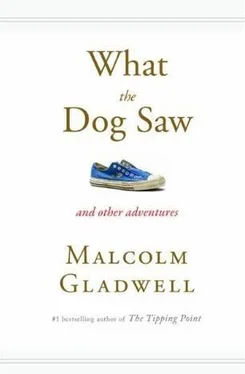Why did the Veg-O-Matic sell so well? Doubtless, Americans were eager for a better way of slicing vegetables. But it was more than that: the Veg-O-Matic represented a perfect marriage between the medium (television) and the message (the gadget). The Veg-O-Matic was, in the relevant sense, utterly transparent. You took the potato and you pushed it through the Teflon-coated rings and—voilà!—you had French fries. There were no buttons being pressed, no hidden and intimidating gears: you could show-and-tell the Veg-O-Matic in a two-minute spot and allay everyone’s fears about a daunting new technology. More specifically, you could train the camera on the machine and compel viewers to pay total attention to the product you were selling. TV allowed you to do even more effectively what the best pitchmen strove to do in live demonstrations—make the product the star.
This was a lesson Ron Popeil never forgot. In his infomercial for the Showtime Rotisserie, he opens not with himself but with a series of shots of meat and poultry, glistening almost obscenely as they rotate in the Showtime. A voice-over describes each shot: a “delicious six-pound chicken,” a “succulent whole duckling,” a “mouthwatering pork-loin roast…” Only then do we meet Ron, in a sports coat and jeans. He explains the problems of conventional barbecues, how messy and unpleasant they are. He bangs a hammer against the door of the Showtime, to demonstrate its strength. He deftly trusses a chicken, impales it on the patented two-pronged Showtime spit rod, and puts it into the oven. Then he repeats the process with a pair of chickens, salmon steaks garnished with lemon and dill, and a rib roast. All the time, the camera is on his hands, which are in constant motion, manipulating the Showtime apparatus gracefully, with his calming voice leading viewers through every step: “All I’m going to do here is slide it through like this. It goes in very easily. I’ll match it up over here. What I’d like to do is take some herbs and spices here. All I’ll do is slide it back. Raise up my glass door here. I’ll turn it to a little over an hour…Just set it and forget it.”
Why does this work so well? Because the Showtime—like the Veg-O-Matic before it—was designed to be the star. From the very beginning, Ron insisted that the entire door be a clear pane of glass, and that it slant back to let in the maximum amount of light, so that the chicken or the turkey or the baby-back ribs turning inside would be visible at all times. Alan Backus says that after the first version of the Showtime came out Ron began obsessing over the quality and evenness of the browning and became convinced that the rotation speed of the spit wasn’t quite right. The original machine moved at four revolutions per minute. Ron set up a comparison test in his kitchen, cooking chicken after chicken at varying speeds until he determined that the optimal speed of rotation was actually six r.p.m. One can imagine a bright-eyed MBA clutching a sheaf of focus-group reports and arguing that Ronco was really selling convenience and healthful living, and that it was foolish to spend hundreds of thousands of dollars retooling production in search of a more even golden brown. But Ron understood that the perfect brown is important for the same reason that the slanted glass door is important: because in every respect the design of the product must support the transparency and effectiveness of its performance during a demonstration—the better it looks onstage, the easier it is for the pitchman to go into the turn and ask for the money.
If Ron had been the one to introduce the VCR , in other words, he would not simply have sold it in an infomercial. He would also have changed the VCR itself, so that it made sense in an infomercial. The clock, for example, wouldn’t be digital. (The haplessly blinking unset clock has, of course, become a symbol of frustration.) The tape wouldn’t be inserted behind a hidden door—it would be out in plain view, just like the chicken in the rotisserie, so that if it was recording you could see the spools turn. The controls wouldn’t be discreet buttons; they would be large, and they would make a reassuring click as they were pushed up and down, and each step of the taping process would be identified with a big, obvious numeral so that you could set it and forget it. And would it be a slender black, low-profile box? Of course not. Ours is a culture in which the term “black box” is synonymous with incomprehensibility. Ron’s VCR would be in red-and-white plastic, both opaque and translucent swirl, or maybe 364 Alcoa aluminum, painted in some bold primary color, and it would sit on top of the television, not below it, so that when your neighbor or your friend came over he would spot it immediately and say, “Wow, you have one of those Ronco Tape-O-Matics!”
Ron Popeil did not have a happy childhood. “I remember baking a potato. It must have been when I was four or five years old,” he told me. We were in his kitchen, and had just sampled some baby-back ribs from the Showtime. It had taken some time to draw the memories out of him, because he is not one to dwell on the past. “I couldn’t get that baked potato into my stomach fast enough, because I was so hungry.” Ron is normally in constant motion, moving his hands, chopping food, bustling back and forth. But now he was still. His parents split up when he was very young. S.J. went off to Chicago. His mother disappeared. He and his older brother, Jerry, were shipped off to a boarding school in upstate New York. “I remember seeing my mother on one occasion. I don’t remember seeing my father, ever, until I moved to Chicago, at thirteen. When I was in the boarding school, the thing I remember was a Sunday when the parents visited the children, and my parents never came. Even knowing that they weren’t going to show up, I walked out to the perimeter and looked out over the farmland, and there was this road.” He made an undulating motion with his hand to suggest a road stretching off into the distance. “I remember standing on the road crying, looking for the movement of a car miles away, hoping that it was my mother and father. And they never came. That’s all I remember about boarding school.” Ron remained perfectly still. “I don’t remember ever having a birthday party in my life. I remember that my grandparents took us out and we moved to Florida. My grandfather used to tie me down in bed—my hands, my wrists, and my feet. Why? Because I had a habit of turning over on my stomach and bumping my head either up and down or side to side. Why? How? I don’t know the answers. But I was spread-eagle, on my back, and if I was able to twist over and do it my grandfather would wake up at night and come in and beat the hell out of me.” Ron stopped, and then added, “I never liked him. I never knew my mother or her parents or any of that family. That’s it. Not an awful lot to remember. Obviously, other things took place. But they have been erased.”
When Ron came to Chicago, at thirteen, with his grandparents, he was put to work in the Popeil Brothers factory—but only on the weekends, when his father wasn’t there. “Canned salmon and white bread for lunch, that was the diet,” he recalls. “Did I live with my father? Never. I lived with my grandparents.” When he became a pitchman, his father gave him just one advantage: he extended his son credit. Mel Korey says that he once drove Ron home from college and dropped him off at his father’s apartment. “He had a key to the apartment, and when he walked in his dad was in bed already. His dad said, ‘Is that you, Ron?’ And Ron said, ‘Yeah.’ And his dad never came out. And by the next morning Ron still hadn’t seen him.” Later, when Ron went into business for himself, he was persona non grata around Popeil Brothers. “Ronnie was never allowed in the place after that,” one of S.J.’s former associates recalls. “He was never let in the front door. He was never allowed to be part of anything.” My father, Ron says simply, “was all business. I didn’t know him personally.”
Читать дальше











